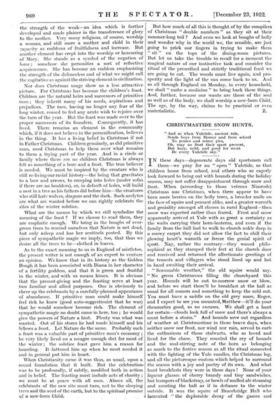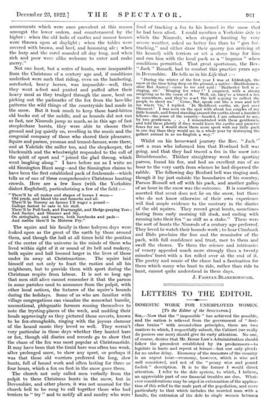CHRISTMASTIDE SNOW HUNTS.
" And so when Yuletide, ancient rule, Sends boys from Homer and from school To ponies and mince pies, Oh, may no frost their sport prevent, But hazy, mild, and good for scent Be every Yuletide sky."
IN these days—degenerate days old sportsmen call -I- them—we pray for an " open " Yuletide, so that children home from school, and others who so eagerly look forward to being out with hounds during the holiday season, may not suffer disappointment through snow and frost. When (according to those veteran Nimrods) Christmas was Christmas, when there appear to have been more berries on the holly trees, a broader smile on the face of squire and peasant alike, and a greatCr warmth and geniality amongst all classes in rural England—then snow was expected rather than feared. Frost and snow apparently arrived at Yule with as great a certainty as the waits carrying their horn-lanterns, and even if the family from the hall had to walk to church ankle deep in a snowy carpet they did not allow the fact to chill their glowing heart's warmth or freeze the genial spirit of sport. Nay, rather the contrary—they waxed philo- sophical as they stamped their feet at the church door and received and returned the affectionate greetings of the tenants and villagers who stood lined up and hat in hand awaiting their arrival.
" Seasonable weather," the old squire would say. " No green Christmases filling the churchyard this year. Hounds will be out to-morrow snow or blow, and before we start there'll be breakfast at the hall as usual for all corners and something to keep the cold out. You must have a saddle on the old grey mare, Roger, and I expect to see you mounted, Matthew—it'll do your rheumatics good, so no excuses. We shall get a hunt for certain—clouds look full of snow and there's always a scent before a storm." And hounds were out regardless of weather at Christmastime in those brave days, when neither snow nor frost, nor wind nor rain, served to curb the enthusiasm of those stalwarts, who so loved and lived for the chase. They counted the cry of hounds and the soul-stirring note of the horn as belonging as much to the festive season as all the ritual connected with the lighting of the Yule candles, the Christmas log, and all the picturesque custom which helped to surround the season with a joy and poetry of its own. And what hunt breakfasts they were in those days ! None of your liqueur glasses of cherry brandy and tiny sandwiches, but bumpers of blackstrap, or bowls of mulled ale steaming and scenting the hall. as if in defiance to the winter outside. It was the squire of Bracebridge Hall who lamented " the deplorable decay .of the games and amusements which were once prevalent at this season amongst the lower orders, and countenanced by the higher : when the old halls of castles and manor houses were thrown open at daylight ; when the tables were covered with brawn, and beef, and humming ale ; when the harp and the carol sounded all day long, and when rich and poor were alike welcome to enter and make merry."
Not one hunt, but a series of hunts, were inseparable from the Christmas of a century ago and, if conditions underfoot were such that riding, even on the lumbering, surcfooted, heavy horses, was impossible—well, then they went a-foot and panted and puffed after their heavy meal as they trudged through the snow, bent on picking out the padmarks of the fox from the lace-like patterns the wild things of the countryside had made in the snow. But it took much to keep those hard-bitten old bucks out of the saddle, and as hounds did not run so fast, nor Nimrods jump so much, as in this age of fast steeplechase bursts, they were able to choose their ground and jog quietly on, revelling in the music and the congenial company of those who shared their pleasures. Squire and parson, yeoman and tenant-farmer, were there, and at Yuletide the miller too, and the shopkeeper, the blacksmith and the wheelwright responded to the call of the spirit of sport and " joined the glad throng, which went laughing along." I have before me as I write an old Sinnington Hunt song—and the Sinnington claims to have been the first established pack of foxhounds—which tells us of one of these comprehensive Christmas hunting crowds. Here are a few lines (with the Yorkshire dialect Englished), particularizing a few of the field :— " There'll be all makes and shapes of horses I ween-
Old prads, and blood tits and fussocks and all.
There'll be Tommy on farmer I'll wager a pound—
Gallops fastest to oats in his stall.
There'll be Pull-back, and Fearnaught, and Hedge-peeping Tom : And Sucker, and Slimmer and Sly,
On stringhalts, and roarers, both barebacks and pads—
And mebbe there'll be Mistress Fry."
The squire and his family in those halcyon days were looked upon as the great of the earth by those around them, and though the hall at all times held the position of the centre of the universe in the minds of those who lived within sight of it or sound of its bell and rookery, both squire and hall loomed larger in the lives of those under its sway at Christmastime. The squire laid himself out not only to feast the rustics and all his neighbours, but to provide them with sport during the Christmas respite from labour. It is not so long ago that men still alive cannot remember it that the parson in some parishes used to announce from the pulpit, with other local notices, the fixtures of the squire's hounds during the holidays. Some of us who are familiar with village congregations can visualize the somewhat bucolic, unemotional, phlegmatic farmers rousing themselves to note the trysting-places of the week, and nodding their heads approvingly as they pictured those coverts, known to be fox-strongholds, ringing with the joyous clamour of the hound music they loved so well. They weren't very particular in those days whether they hunted hare or fox, though old diaries and records go to show that the chase of the fox was most popular at Christmastide. It may have been that the timid hare was often too weak, after prolonged snow, to show any sport, or perhaps it was that these old warriors preferred the long, slow hunts, full of hound work and often lasting for three or four hours, which a fox on foot in the snow gave them.
The church not only called men verbally from the pulpit to these Christmas hunts in the snow, but in Devonshire, and other places, it was not unusual for the church bell to be rung to call together those who had terriers to " try " and to notify all and sundry who were fond of tracking a fox to his kennel in the snow that he had been afoot. I could mention a Yorkshire dale in which the Nimrods, when stopped hunting by very severe weather, asked no better fun than to " gan fox . tracking," and either draw their quarry (on arriving at his kennel) with terriers or set a stone trap for him and run him with the local pack as a " bagman " when conditions permitted. That great sportsman, the Rev• " Jack " Russell, had to combat this practice years ago in Devonshire. He tells us in his Life that :— " During the winter of the first year I was at Iddesleigh, the snow at the time lying deep on the ground, a native—Bartholomew, alias Bat Anstey—came to me and said : Hatherley bell is a- ringing, sir.' Ringing for what ? ' I enquired, with a strong misgiving as to the cause of it. Well, sir, they've a-traced a fox in somewhere, and they've a-set the bell a-going to collect the people to shoot un.' Come, Bat, speak out like a man and tel
me where 'tis,' I replied. In hleddlecot earths, sir, Just over Okement.' I was soon on the spot with about ten couples of my little hounds, and found standing around the earths about a hundred fellows—the scum of the country—headed, I am ashamed to say, by two gentlemen. . . . I remonstrated with these gentlemen, and told them plainly if they would leave the earths and preserve foxes for me I would show them more sport with my little pack in one day than they would see in a whole year by destroying the gallant animal in so un-English a way."
Whilst on his homeward journey the Rev. " Jack '' met a man who informed him that Dowland bell was going, and that they had traced a fox in the snow into Brimblecombe. Thither straightway went the sporting parson, found his fox, and had an excellent run of an hour to the very earth from whence he had dispersed the rabble. The following day Beaford bell was ringing and, though it lay just outside the boundaries of his country, Parson Russell set off with his pack, and another gallop of an hour in the snow was the outcome. It is sometimes asserted that scent does not lie on the snow, but those who do not know otherwise of their own experience will find ample evidence to the contrary in the diaries of the old squires. They record great hunts, sometimes lasting from early morning till dusk, and ending with running into their fox " as stiff as a stake." These were the sort of hunts the Nimrods of a century ago preferreq. They loved to watch their hounds work ; to hear Climbank and Dido proclaim the line and the remainder of the pack, with full confidence and trust, race to them and swell the chorus. To them the science and intricacies of venery appealed much more strongly than a twenty minutes' burst with a fox rolled over at the end of it. The poetry and music of the chase had a fascination for them which many who hunt to ride, rather than ride to hunt, cannot quite understand in these days.
J. FAIRFAX-BLAKEBOROUGII.











































 Previous page
Previous page